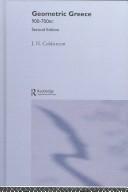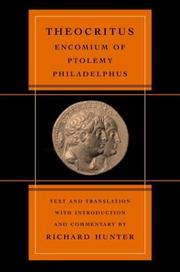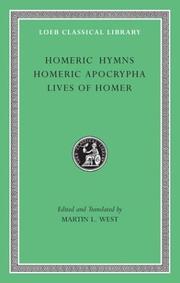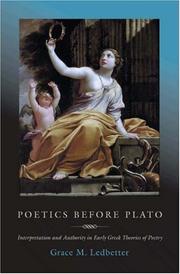| Listing 1 - 4 of 4 |
Sort by
|

ISBN: 0415298989 9780415298995 9780415298988 0415298997 1134425155 1280101725 0203425766 1134425147 9780203425763 6610101728 9786610101726 9781134425150 9781280101724 9781134425105 9781134425143 Year: 2003 Publisher: London ; New York : Routledge,
Abstract | Keywords | Export | Availability | Bookmark
 Loading...
Loading...Choose an application
- Reference Manager
- EndNote
- RefWorks (Direct export to RefWorks)
Provides the only detailed archaeological survey of the ninth and eighth century BC - an astonishingly creative era in Greek history.
Beschaving [Homerische ] --- Civilisation homérique --- Civilization [Homeric ] --- Grèce d'Homère --- Homeric civilization --- Homerisch Griekenland --- Homerische beschaving --- Homerische cultuur --- Homerische tijd --- Civilization, Homeric --- Greece --- Grèce --- History --- Antiquities --- Histoire --- Antiquités --- Civilisation homérique --- Grèce --- Antiquités --- Geometric period, ca. 900-700 B.C. --- Civilization, Homeric. --- Antiquities.

ISBN: 0520235606 1282356968 0520929373 9786612356964 1597345962 9780520929371 1417525665 9781417525669 9780520235601 Year: 2003 Volume: 39 Publisher: Berkeley : University of California Press,
Abstract | Keywords | Export | Availability | Bookmark
 Loading...
Loading...Choose an application
- Reference Manager
- EndNote
- RefWorks (Direct export to RefWorks)
Under Ptolemy II Philadelphus, who ruled Egypt in the middle of the third century B.C.E., Alexandria became the brilliant multicultural capital of the Greek world. Theocritus's poem in praise of Philadelphus-at once a Greek king and an Egyptian pharaoh-is the only extended poetic tribute to this extraordinary ruler that survives. Combining the Greek text, an English translation, a full line-by-line commentary, and extensive introductory studies of the poem's historical and literary context, this volume also offers a wide-ranging and far-reaching consideration of the workings and representation of poetic patronage in the Ptolemaic age. In particular, the book explores the subtle and complex links among Theocritus's poem, modes of praise drawn from both Greek and Egyptian traditions, and the subsequent flowering of Latin poetry in the Augustan age. As the first detailed account of this important poem to show how Theocritus might have drawn on the pharaonic traditions of Egypt as well as earlier Greek poetry, this book affords unique insight into how praise poetry for Ptolemy and his wife may have helped to negotiate the adaptation of Greek culture that changed conditions of the new Hellenistic world. Invaluable for its clear translation and its commentary on genre, dialect, diction, and historical reference in relation to Theocritus's Encomium, the book is also significant for what it reveals about the poem's cultural and social contexts and about Theocritus' devices for addressing his several readerships. COVER IMAGE: The image on the front cover of this book is incorrectly identified on the jacket flap. The correct caption is: Gold Oktadrachm depicting Ptolemy II and Arsinoe (mid-third century BCE; by permission of the Museum of Fine Arts, Boston).
Ptolemy II Philadelphus, King of Egypt --- Theocritus --- Ptolemy --- Ptolemaeus --- Ptolemy II Philadelphus --- Poetry --- LITERARY CRITICISM / Ancient & Classical. --- alexandria. --- ancient egypt. --- ancient greece. --- aristophanes. --- arsinoe ii. --- art. --- augustan poetry. --- classical studies. --- clouds. --- egypt. --- encomium. --- genre studies. --- greek culture. --- greek poetry. --- greek world. --- hellenism. --- hellenistic poetry. --- hellenistic world. --- heracles. --- homeric hymn. --- hymn. --- king. --- latin poetry. --- literary criticism. --- monarchy. --- mythology. --- patronage. --- patrons. --- pharaoh. --- pharaonic traditions. --- philadelphus. --- pithom stele. --- poetic meter. --- poetic tribute. --- poetry. --- poets. --- praise. --- ptolemaic dynasty. --- ptolemy ii. --- reign. --- ruler. --- theocritus. --- third century. --- zeus.

ISBN: 0674996062 9780674996069 Year: 2003 Volume: 496 Publisher: Cambridge (Mass.) : Harvard university press,
Abstract | Keywords | Export | Availability | Bookmark
 Loading...
Loading...Choose an application
- Reference Manager
- EndNote
- RefWorks (Direct export to RefWorks)
The earliest poems extant under the title Homeric Hymns date from the seventh century BCE. Comic poems in the Homeric Apocrypha include the Battle of Frogs and Mice (probably not earlier than first century CE). Lives of Homer include a version of The Contest of Homer and Hesiod that dates from the second century BCE.
Homer --- Hymns, Greek (Classical) --- Greek poetry --- Poets, Greek --- Hymnes grecs anciens --- Poésie grecque --- Poètes grecs --- Translations into English --- Biography --- Traductions anglaises --- Biographies --- Homer. --- Authorship. --- Homeric hymns --- Translations into English. --- Authorship --- -Poets, Greek --- Greek poets --- Greek literature --- -Authorship --- Inni omerici --- Homērikoi hymnoi --- Hymni Homerici --- Languages & Literatures --- Greek & Latin Languages & Literatures --- Homeros --- Homère --- Homerus --- Poésie grecque --- Poètes grecs --- Hóiméar --- Hūmīrūs --- Gomer --- Omir --- Omer --- Omero --- Ho-ma --- Homa --- Homérosz --- האמער --- הומירוס --- הומר --- הומרוס --- هومر --- هوميروس --- 荷马 --- Ὅμηρος --- Гамэр --- Hamėr --- Омир --- Homero --- 호메로스 --- Homerosŭ --- Homērs --- Homeras --- Хомер --- ホメーロス --- ホメロス --- Гомер --- Homeri --- Hema --- Pseudo-Homer --- Pseudo Omero --- Greek hymns --- Authoring (Authorship) --- Writing (Authorship) --- Literature --- Hymns, Greek (Classical) - Translations into English --- Greek poetry - Translations into English --- Poets, Greek - Biography - Early works to 1800. --- Griekse literatuur --- klassieke literatuur

ISBN: 0691096090 9786612087646 1282087649 1400825288 9781400825288 9780691096094 Year: 2003 Publisher: Princeton, N.J. : Princeton University Press,
Abstract | Keywords | Export | Availability | Bookmark
 Loading...
Loading...Choose an application
- Reference Manager
- EndNote
- RefWorks (Direct export to RefWorks)
Combining literary and philosophical analysis, this study defends an utterly innovative reading of the early history of poetics. It is the first to argue that there is a distinctively Socratic view of poetry and the first to connect the Socratic view of poetry with earlier literary tradition. Literary theory is usually said to begin with Plato's famous critique of poetry in the Republic. Grace Ledbetter challenges this entrenched assumption by arguing that Plato's earlier dialogues Ion, Protagoras, and Apology introduce a distinctively Socratic theory of poetry that responds polemically to traditional poets as rival theorists. Ledbetter tracks the sources of this Socratic response by introducing separate readings of the poetics implicit in the poetry of Homer, Hesiod, and Pindar. Examining these poets' theories from a new angle that uncovers their literary, rhetorical, and political aims, she demonstrates their decisive influence on Socratic thinking about poetry. The Socratic poetics Ledbetter elucidates focuses not on censorship, but on the interpretation of poetry as a source of moral wisdom. This philosophical approach to interpreting poetry stands at odds with the poets' own theories--and with the Sophists' treatment of poetry. Unlike the Republic's focus on exposing and banishing poetry's irrational and unavoidably corrupting influence, Socrates' theory includes poetry as subject matter for philosophical inquiry within an examined life. Reaching back into what has too long been considered literary theory's prehistory, Ledbetter advances arguments that will redefine how classicists, philosophers, and literary theorists think about Plato's poetics.
Aesthetics, Ancient --- Authority in literature --- Greek poetry --- -Poetics --- -Poetry --- Greek literature --- History and criticism --- -Theory, etc --- History --- -Technique --- Authority in literature. --- Aesthetics, Ancient. --- Poetics --- Theory, etc. --- History and criticism&delete& --- Theory, etc --- Greek poetry - History and criticism - Theory, etc. --- Poetics - History - To 1500. --- A Preface to Paradise Lost. --- Against the Sophists. --- Allegory. --- Ambiguity. --- Archilochus. --- Biographical criticism. --- Concept. --- Counterexample. --- Criticism. --- Crito. --- Demodocus (Odyssey character). --- Didacticism. --- Dogma. --- Eloquence. --- Epic poetry. --- Euthyphro (prophet). --- Explanation. --- Falsity. --- Fiction. --- Fifth-century Athens. --- G. (novel). --- Generosity. --- Genre. --- Hermeneutics. --- Hesiod. --- Hippias Major. --- Hippias. --- Homer. --- Homeric scholarship. --- Iliad. --- Imagery. --- Inference. --- Iris Murdoch. --- Irony. --- Knowledge. --- Literary criticism. --- Literary fiction. --- Literary theory. --- Literature. --- Metaphor. --- Mimesis. --- Moral authority. --- Morality. --- Muse. --- Narrative. --- New Criticism. --- Notion (ancient city). --- Odes (Horace). --- Odysseus' scar (Auerbach). --- Odysseus. --- Oracle. --- Peleus. --- Phemius. --- Philosopher. --- Philosophy and literature. --- Philosophy. --- Pindar. --- Plato. --- Platonism. --- Poet. --- Poetic tradition. --- Poetics (Aristotle). --- Poetics. --- Poetry. --- Political poetry. --- Post-structuralism. --- Principle of charity. --- Prodicus. --- Protagoras. --- Reason. --- Relativism. --- Rhapsode. --- Rhetoric. --- S. (Dorst novel). --- Satire. --- Skepticism. --- Socrate. --- Socratic method. --- Socratic. --- Sophist. --- Storytelling. --- Suggestion. --- Superiority (short story). --- Supplication. --- Swarthmore College. --- Symptom. --- Telemachus. --- The Death of the Author. --- Theogony. --- Theory of Forms. --- Theory. --- Thought. --- Trojan War. --- Uncertainty. --- Veracity (Mark Lavorato novel). --- Verisimilitude (fiction). --- Verisimilitude. --- William Shakespeare. --- Works and Days. --- Xenophanes.
| Listing 1 - 4 of 4 |
Sort by
|

 Search
Search Feedback
Feedback About UniCat
About UniCat  Help
Help News
News